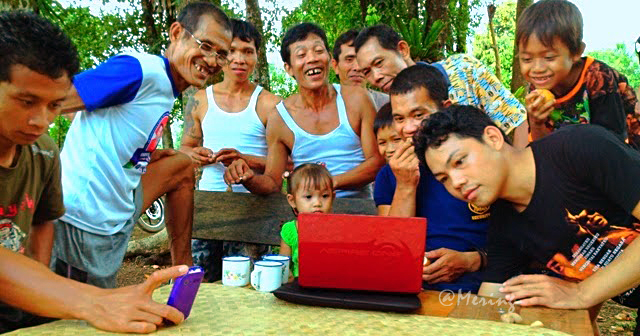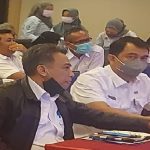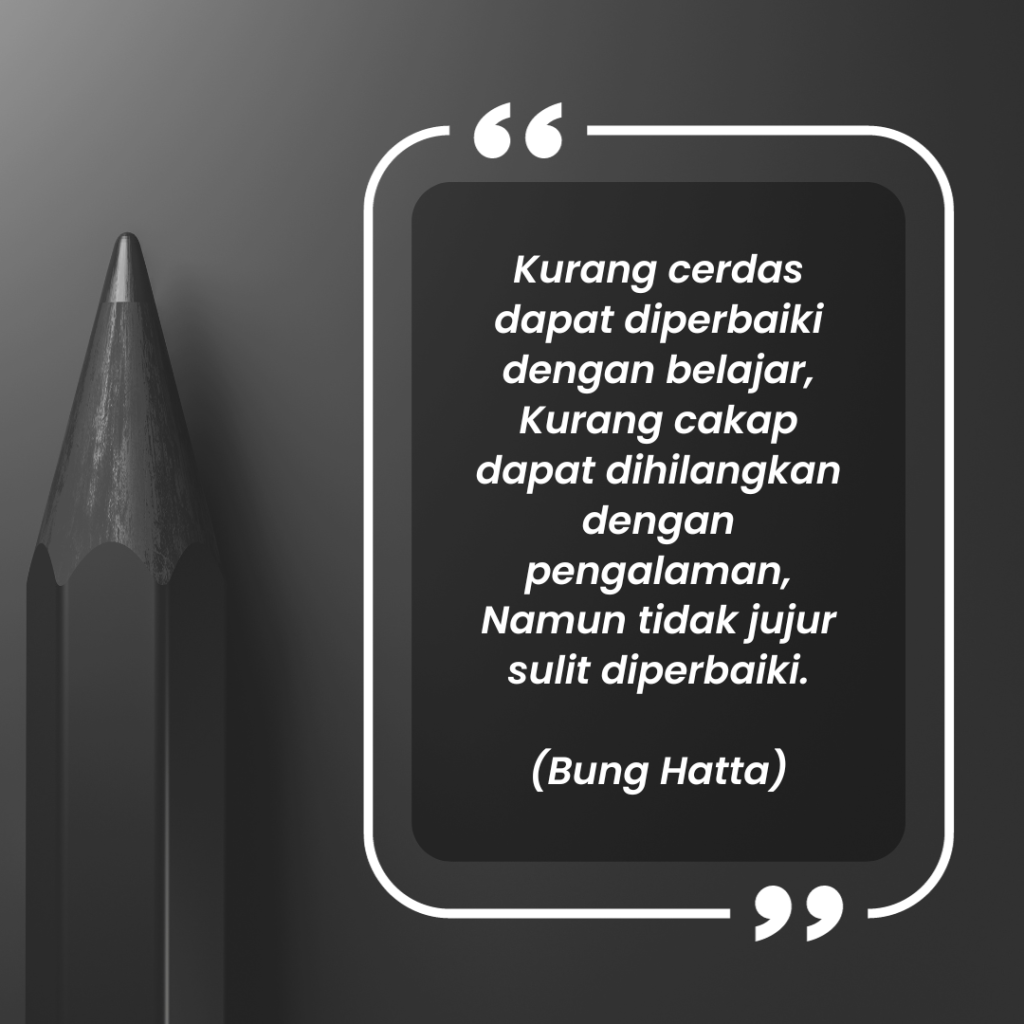BY ALEXANDER MERING
The moon moved from the jackfruit tree, illuminating a few stray fireflies circling above the village where a wedding was taking place.
The night was late, but the deafening noise from the dangdut songs mixed with folk songs blaring from the stage had attracted the non-stop attention of people from all over.
It was not only the locals, but also workers from the palm oil plantation and forest harvesters from the nearby camps.
A few of the men sat cross-legged under the blue tents by the side of the stage. It was near the warung- warung (stalls). One or two of them looked in our direction with suspicion. They knew Laurensius Edi, but surely they did not know me, as I had only started frequenting the village this past month.
Edi is a handsome man, with fair and clear skin like most Dayak Salako. Don’t ask him how many girlfriends he has, though. He was also one of the few youths from Loncek village that were fortunate enough to attend school. His father was a pensioner who had taught in primary school, and had to bring up eight children, one of them is Edi. For his school fees, Edi would take up any job — selling sausages, used clothing and even become a forest harvester.
Yayasan Pemberdayaan People Forest and Ripe Nusantara (YPPN) Pontianak carried out an assessment in 2011 at Teluk Bakung village and found that there were no less than 200 youths who had dropped out of school (OMPS), including at Loncek.
I couldn’t resist my curiosity and tapped Edi on the arm; he was busy watching the dancers at the karaoke stage.
“Those people gathering under the stage, what are they doing?”
“They are playing kolok-kolok, bang*.”
I frowned. Kolok- kolok is a gambling game played with three dices and six pictures on a canvas the size of a cardboard.
“Crab, fish, prawn, moon, vase, flower,” screamed the bandar (gambling bookie).
I felt uneasy sitting here. A few of the men were still staring at me piercingly. Just then, a waiter came along and offered beer, alcohol, peanuts and fried pork.
“Just beer,” I said. Maybe a sip of beer would wash away the chills I felt. From the warung, I could see on the stage four women wearing bikinis, in action and bending sideways as if in a trance like Trio Macan (popular dangdut singing group in Indonesia). There was also a singer whose body was shining due to her sweat, shimmering under the neon lights of the stage.
“O…o..o..o...iwak peyek,** iwak peyek iwak peyek nasi jagung. Sampe tuek, sampe nenek, Trio Macan tetap disanjung”. (excerpt of song: iwak peyek, iwak peyek iwak peyek corn rice. Until you’re old, a grandma, Trio Macan will still be celebrated).
***
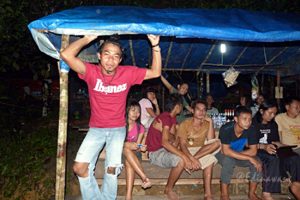
“Crab, prawn, fish, moon, vase, flower. The stocky built bookie sat cross-legged in the midst, bye the side of the stage and shouted the words again. He shook the dice box; like a magnet it attracted the attention of people around it. I took a glance.
” I bet on … Boss,” said a lad in green boots. He was probably a worker at the palm oil plantation not far from the village. Not many in the village had a good pair of boots such as those.
” I bet omon on this,” said guy in red shirt. He took a fistful of money from his tattered waist bag and threw it on the canvas. His money was folded into two.
“All right, who else? Bet on it, bet, bet. Crab, prawn, fish, moon, vase, flower,” said the bookie provocatively. His face shone brightly hit by the rays of the neon lamp under the tent.
Kupan is a term for a bet; if the image appears on the dice is the same as the bet, then the person wins the equivalent as determined by the bookie. For omon bets, they are paid five times the wager they put at stake.
Across the kolok-kolok there is another group busily playing Tepo. In Loncek it is known as Tongkok, the Chinese poker well known among the local community especially along the East Coast of West Kalimantan. To play the Tepo, one also uses a dice but a much smaller one compared to the ones used for kolok-kolok. It is cube- like with kanji writing in red and white on its side.
“Can they write kanji?”
“No, they cannot read (the Chinese characters)”
“Then how do they play the game?”
“They only need to remember the color on the dice, that’s all.”
Hmm, I looked at Edi. How did this young lad know so much about gambling? He smiled, knowing the questions in my head.
“I have known gambling since es-em-pe (SMP or middle school). Kolok-kolok was my favorite game, but not anymore.”
“Why?”
Edi did not answer. He laughed and turned towards the crowd. I, too, looked at the crowd. From the side of the tent, a small child and a lady entered the area. The child looked not more than ten years old, and had placed a bet with Rp1000. The lady who was his mother, also placed a bet. His eyes were smiling and they shouted in triumph as she and her son were paid by the bookie. Oh my God! Who the hell taught these Dayaks to gamble?! Where has Indonesia been these past 67 years, till the mothers teach their children to gamble without a hint of guilt or shyness?
At the dice area, people meet; at the karaoke stage people indulge in pleasure. The palm oil workers, forest harvesters, rubber tappers, gambling haven, the children and villagers looking for a way to become happy; forget for an minute the suffering they feel living as villagers in a huge country named Indonesia.
Not all Loncek villagers agree to this, many reject it and are upset. But then, they are only villagers and farmers. Stunned at the changes they see. What was only on the television is now present in their homes; and could not be condoned by the customs (adat) they uphold.
Suddenly I was overcome with nausea. I felt suffocated and hurt. I drank some more beer. I was unsure now, whether I was drunk from the beer or seeing the reality of a community that has never been seriously taken care of by this Republic.
Luckily, there are still programs by PNPM Peduli, I said trying to cheer myself up. Loud beats from the House music was drowning out all noise, and the dancers were becoming more provocative…
As far as I can remember, this is not the Dayak custom. They never had the technology to distill alcohol. Dayak Iban, Jangkang, Mualang and several other Dayak ethnics in the interior could only make tuak, a drink made from the fermentation of sticky rice and yeast. How did they learn of the dice? They never knew that the ancient Greeks loved to play using the dice. Maybe the ancestors of Dayak Salako interacted with the Chinese gold miners at Mandor and Monterado. By the Hee Soon group or Lanfang, around 1770M, before a small group of Dayak Salako came to Ambawang river and became the ancestors of Loncek village.
According to Yohanes Aboy, a community leader and Loncek’s Catholic head, the isolation of the village was only opened to outsiders in 2010, when a palm oil plantation owned by PT. Palmdale Agro Asia Lestari opened up a company and built a road to the area. The only route to the village at the time was using the river. If the river subsided,it would take up to three days and two nights using a motorboat to reach Loncek village from Pontianak city, the capital city of West Kalimantan.
Administratively, Loncek is located at the end of Ambawang River district, Kubu Raya regency, West Kalimantan province and is also a part of Teluk Bakung village. It shares borders with Tayan Hilir district, Sanggau Regency.
According to Gaeb, the settlement of the Salako community in Loncek existed since 1910, ‘opened by two people named Nek Motek and Timanggong’, long before the Indonesian nation was born. He was one of Nek Motek’s ancestors. That was why he was shocked that the residents of Loncek could not claim rights to their own land.
Village headman, Valentinus Agib told me that this was because the Indonesian government had declared the area as part of its territory for Forest Production (HP).
House music changed to a dangdut beat, mixed with the heady scent of beer poured by the waiter. This did not chase the chills. I hugged my jacket closer, as the morning dew was starting to fall from the sky.
Edi blurted out again, with an expression hard to decipher. Now, the fiesta was never for only a day. There were at times the celebration would last for weeks. As a result, not only were work delayed, the money obtained from hard work usually fell prey to the charms of the dice. There were no savings, said Edi, disgruntled. He looked on anxiously. I asked the waiter to pour us more beer.
Edi drank the beer, cooled by the lowering temperature of the night. He explained that the fiesta in his village had never been like this. It used to be celebrated with customs and rituals — for weddings, village events and the like. Even for deaths, a host would usually only invite a mask dancer, never a sexy karaoke dancer like nowadays. It used to be that the sense of community gatherings would be observed and guarded well.
A half-drunk man approached the stall. He borrowed a lighter to light his cigarette. The night had turned to dawn. A drop of dew fell from the stall rooftop straight into the cup. I drank the beer mixed with dew, feeling disturbed. I was definitely not drunk, and wanted to hear more of Edi’s stories.
“Edi, who started the karaoke sessions in this village?”
“I don’t know when, but it was since We’ Bunga. Now it has become a norm at each festival. As far as I can remember, it happened since the road to our village opened,” said Edi.
We’ Bunga is the name given for the Citra Dancer karaoke boss in Pontianak. This group existed along the Ambawang river and its surrounding, including at Loncek village.
***
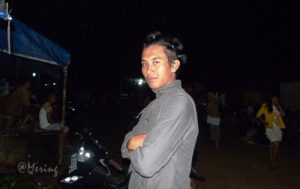
This was how Loncek was known to the outside world. Even a pastor stationed at Loncek Canisius Saint church expressed his sadness and grief at the sad reality of the Loncek community.
The establishment of the Palambon Pucuk Baguas Young Farmers Group (KTM PPB) early October 2011 made me visit to stay at Loncek more often. At times, I would follow stay overnight woth the forest harvesters while discussing the future of their village. On another note, the men who became members of KTM PPB are forest harvesters, while its women members are palm oil workers and rubber tappers. All of them were school dropouts.
Edi and Leonardus, are the main movers of the organisation. To fund his education, Edi even had to harvest the forest. While Leo is the leader for the Young Catholic Youths (OMK) Loncek. In the first part of the PNPM Peduli program, Leo was chosen as leader for KTM PPB. While Edi became the facilitator local for the program. He had also attended the facilitator training in Jogjakarta carried out by the organisation.
***
One afternoon, in the middle of 2012 Edi approached me smiling widely. In his hand was a small, green colored book with Dayak motives.
“What is that?”
“It’s a CU savings book. KTM PPB now have their own savings fund ,” said Edi showing me the book.
CU is the short form of Credit Union, a micro-credit institution popular in West Kalimantan. The KTM PPB leader had begun to save in CU Pancur Kasih, one of the largest savings cooperation here. According to Yati Lantok, Pancur Kasih members total more than 110 358 thousand with a total asset of Rp 1. 2 trillion per month as of May 2012. Yati is the General Manager of CU Pancur Kasih Pontianak. Other than CU Pancur Kasih, the other large CUs here include CU Keling Kumang and CU Lantang Tipo.
Since the PNPM Peduli Program started at Loncek village, Edi had stopped selling dog meat, as well as sausages and used clothing from house to house. He was busy as the facilitator, and also teaches part-time at a high school owned by the Catholic Association at Ambawang river. He also sells chicken for a living. He never gambles, nor dances to the dangdut tunes with the karaoke dancers. The salary he makes as a facilitator, teacher and chicken business is deposited into his account at CU Pancur Kasih. The money is also used to further his studies.
“Waah, it’s not only Edi who has saved up! I have saved up some money too since last June,” protested Nani Sugiarti, one evening when I praised Edi. We were talking beneath the jackfruit tree, in Edi’s front yard.
Nani is a sweet, simple girl chosen by her friends to be the group’s secretary. She was the only KTM PPB member to have had a proper education I used to meet her early in the morning, while she was preparing to go tap rubber with her mother. Now, Nani is the assistant manager of PT. Palmdale Agro Asia Lestari a palm oil plantation. Nevertheless, she still joins in the activities of the group.
“Ya, Bang. Paustinus, Sarjono, Ropinus Induk, Emerensiana and most of our friends have started saving at CU,” said Edi proudly.
I was silently proud of them. It was not in vain then to have gone back and forth to the village to manage the PNPM Peduli program.
There were many changes at Loncek village. It was not only the output, but also the outcome of the program —some that were not even targeted. The organisation of young farmers not only had technical know- how, for example rubber tapping methods and write a village book, but also to slowly come out of a hedonistic way of life.
Now, they had land for thousands of rubber trees that would be germinated to have the best rubber seedlings. It would be sold for their own (land) or sold to other farmers. This group would later inspire several farming women at Teluk Bakung village. A total of 60 women farmers would form their own agro organisation called Kelompok Tani Burung Arue (KTBA), followed by the men with their own group — Kelompok Tani Sabaya Mao (KTSM). Now, routinely every week the KTM PPB would train and help the two new groups.
***
One afternoon in January, Edi came with 12 Loncek youths to my house in Pontianak. I served them cakes and bought several bottles of beer. It was not a fiesta or karaoke in their village, but it was to celebrate Christmas and the New Year 2013 celebrations. This is why the beer was cold, and not slightly chilled by the early morning dew of Loncek.
After talking for a while, I asked Edi a question that I had him a year ago. I was keen to hear his story, not his answer.
“So, why did you stop gambling?”
The other youths in the living room stopped talking and looked at us. Edi did not look away this time, like he did a year ago.
“Although I am not yet rich, I understand my situation better. What good is it to gamble?”
He was right. He did not have to sell dog meat that cost Rp 30 000 a plate. He did not have to sell used clothing from house to house just like when I met him for the first time during an assessment in Loncek. He was now a final year undergraduate at the Mathematics and Natural Sciences Faculty (MIPA) at University Tanjungpura, Pontianak. He was an educator, facilitator and was now flying from places to places on a plane.
He told of his last days spent playing the dice. It was during his years at lower secondary school (SMP). To obtain an education, Edi had to leave his parents at home in the village. He lived at the student hostel owned by the church at Korek village not far from his own village about a day’s journey using a motorboat.
One night during a festival in the village, he went with his uncle and bet on his whole savings at the gambling table. If he won, he would be able to pay his school fees and all expenses for his stay at the hostel. But, what happened next? All the money he saved up from selling dog meat was gone — taken by the bookie. He had wanted to return to his hostel with a mountain of money, now his luck was turned and he was left with bitterness and tears.
“I asked money from my uncle, but he said that he too had none.”
I heaved a long sigh after listening to Edi’s story. I turned to look at each of the youth sitting silently at the living room. Some were pretending to hold their glasses or fiddle with their hand phones and the others looked dumbfounded, unsure of their thoughts.
I did not say anything. It is enough for me that people would be able to listen and hear this story one day. I only know that to change a person or even a community is not as simple as throwing dice. They are the ones who have to find their own path. To get to that path, they need information and enough knowledge to make a sound decision. As knowledge is the light, even if it is only as bright as the lights of the fireflies, it will still be meaningful to those whose lives are covered by the dark.
* bang — brother
** iwak peyek — a type of cracker

